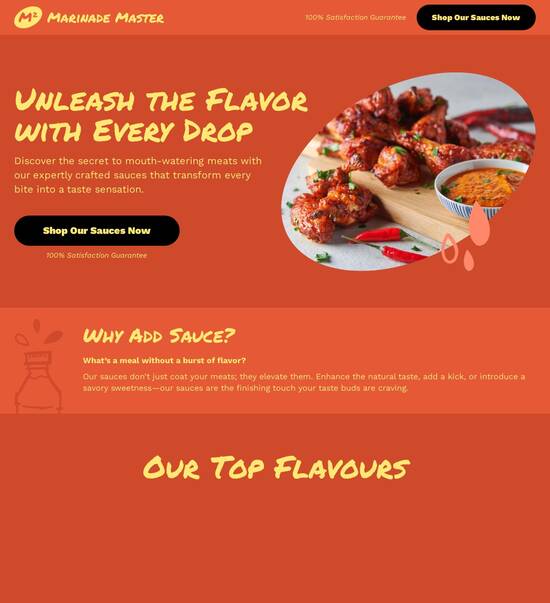
HTML page template for Risk management consultants
Use TemplateAbout template
Attract clients and showcase your skills with style using our landing page templates for Risk management consultants. Let's convert those visitors into clients!
Recommended templates

Easy to build without coding
With the intuitive drag-and-drop builder, anyone on your team can create high-converting pages without any knowledge of code or design. Make enhancements to your landing page with custom widgets using Javascript, HTML/CSS, or third-party scripts.

Multiple layouts for any industry and goal
Select from 500+ landing page layouts built to boost conversions across industry-specific scenarios. Customize them by adjusting fonts, adding images, and generating on-brand content with the AI assistant. Quickly scale with Instablocks® and Global Blocks that you can save, reuse, and update globally.

Loads fast and looks polished on any device
Every template is responsive, which means they present professionally on any device and load blazingly fast with our Thor Render Engine. You can also power them up with Google AMP technology to deliver an unparalleled mobile experience and drive higher conversions.

Robust analytics & experimentation
Get real-time updates and reporting across all your devices, showing the number of visitors, conversions, cost-per-visitor, and cost-per-lead. Launch AI-powered experiments, run A/B tests, and use heatmaps to analyze user behavior, then optimize your landing page to maximize conversions.







Easy to build without coding
With the intuitive drag-and-drop builder, anyone on your team can create high-converting pages without any knowledge of code or design. Make enhancements to your landing page with custom widgets using Javascript, HTML/CSS, or third-party scripts.
Multiple layouts for any industry and goal
Select from 500+ landing page layouts built to boost conversions across industry-specific scenarios. Customize them by adjusting fonts, adding images, and generating on-brand content with the AI assistant. Quickly scale with Instablocks® and Global Blocks that you can save, reuse, and update globally.
Loads fast and looks polished on any device
Every template is responsive, which means they present professionally on any device and load blazingly fast with our Thor Render Engine.
Robust analytics & experimentation
Get real-time updates and reporting across all your devices, showing the number of visitors, conversions, cost-per-visitor, and cost-per-lead. Launch AI-powered experiments, run A/B tests, and use heatmaps to analyze user behavior, then optimize your landing page to maximize conversions.
All the features you need to build lead-generating landing pages
Explore more featuresLearn how to build top-performing landing pages for any goal
FAQs
Leading the way in building high-performing landing pages





An effective landing page template for risk management consultants
To achieve optimal performance in your risk management consultancy, utilizing landing page templates specifically designed for your niche is crucial. Instapage's high-converting design elements can enhance your marketing strategy by creating a professional and engaging online presence.
Understanding the importance of tailored landing pages
Tailored landing pages play a vital role in converting visitors into clients. With Instapage, you can quickly create pages that speak directly to the concerns of risk management clients, ensuring that your services are communicated effectively. Utilizing specialized content means that your potential clients will see the relevance and importance of your offerings right away.
- Customized layouts: Instapage provides templates that can be adjusted to suit specific risk management niches, such as financial risk assessment.
- Consumer trust: A professional landing page builds trust with clients by showcasing your expertise in managing risk effectively.
- Lead generation: Use engaging forms and calls-to-action to capture leads effectively through focused landing pages.
Step one: Choosing the right template for your consultancy
The first step in creating high-converting landing pages is selecting the appropriate template. Instapage offers a range of options tailored for industries like education, financial services, and more. Select one that matches the tone and services of your consultancy.
Step two: Integrating lead generation elements
Once your template is chosen, the next step is to enhance it with essential lead generation elements. These include contact forms, downloadable resources, and compelling calls-to-action.
- Forms: Include simple and easy-to-complete forms that capture essential client information without overwhelming them.
- Lead magnets: Offer free resources, such as guides or case studies, that require clients to input their contact details.
- Clear CTAs: Use action-oriented language in your buttons to encourage users to engage and convert.
Step three: Optimizing your landing page for conversions
Optimization is key to ensuring that your landing pages perform well. A/B testing different elements allows you to find what resonates best with your audience.
- Analytics tools: Utilize Instapage's built-in analytics to track user behavior and conversion rates.
- A/B testing: Conduct regular tests on headlines, images, and CTAs to see which variations yield the highest conversions.
- Feedback loops: Gather feedback from existing clients to enhance usability and effectiveness of your landing pages.
In conclusion, leveraging customizable landing page templates enables risk management consultants to create effective, result-driven web pages that showcase their services.
Get started with Instapage today to unleash the full potential of your landing page templates and watch your risk management consultancy thrive!
People also ask about HTML page template for Risk management consultants
HTML page templates for risk management consultants
Understanding the landscape of risk management consulting
Risk management is a critical function across multiple industries, protecting organizations from potential hazards that could impact their financial stability, reputation, or operational efficiency. Whether it’s in financial services, healthcare, energy, or government, risks can vary widely, ranging from market fluctuations to cybersecurity threats. The structured approach to risk management enables organizations to identify, evaluate, and mitigate these risks systematically, ensuring informed decision-making.
Risk management consultants play an essential role in this landscape. Their primary responsibility is to assess and mitigate risks across various scenarios, ensuring that clients can navigate challenges effectively. These professionals deliver reports, risk assessments, and strategic recommendations tailored to specific organizational needs, leading to significant outcomes like increased resilience and operational efficiency.
The need for specialized HTML page templates
The complexity and diversity of risks that organizations face necessitate a unique approach when creating project deliverables. Risk management consultants often deal with multifaceted problems requiring extensive communication and documentation. This is where HTML page templates become invaluable; they provide a standardized format for presenting intricate data clearly and coherently, enhancing understanding for stakeholders.
Consistency in branding and messaging to strengthen identity.
Time-saving benefits help consultants focus on client engagement rather than format.
Improved user experience ensures that crucial information is easy to digest.
Deep dive into HTML page templates for risk management
Effective HTML templates should have a well-organized structure that includes clear headers and subheaders. This organization allows for fast navigation through lengthy documents. Incorporating visual elements like charts or graphs is essential as they help represent data visually, making complex information easier for clients to understand. Responsive design is also critical, ensuring accessibility across various devices, from desktops to smartphones.
Customization is another vital aspect, allowing consultants to tailor templates to their branding. Color schemes can be aligned with corporate identities, while modular design elements enable quick updates or replacements. This flexibility ensures that each project page remains relevant and professional, catering to specific needs without starting from scratch.
Matrix templates: a fundamental tool for risk assessment
Risk assessment matrices serve as critical tools in identifying and prioritizing risks. These matrices outline potential threats and evaluate their likelihood and impact, offering a visual representation that makes understanding risk dynamics intuitive. Examples of such matrix templates include those focusing on financial, operational, or regulatory risks, helping teams communicate their findings effectively.
Risk likelihood and impact assessment matrix.
Regulatory compliance risk matrix.
Operational risk prioritization matrix.
Integrating these matrices into HTML pages with interactive elements can enhance engagement. Users can click through different data points to see detailed breakdowns, which not only improves data analysis but also fosters a more hands-on approach to understanding risks in real-time. Case studies demonstrating such integrations can showcase their effectiveness in real-world scenarios.
Spreadsheets and their role in risk management planning
Spreadsheets complement HTML templates effectively by providing enhanced features for data analysis and reporting. They allow consultants to document risk management plans clearly, making complex numerical data more manageable. These can include templates for risk assessment, risk tracking, and mitigation actions, ensuring all vital information is centralized.
Project risk management plan templates help outline project scope and objectives.
Risk tracking and mitigation spreadsheets monitor ongoing risks and responses.
Stakeholder communication logs track interactions and resolutions.
By linking spreadsheets to HTML templates, risk management consultants can create a unified system for data sharing, allowing for real-time updates. This integration empowers teams to make informed decisions quickly and ensures stakeholders remain looped in throughout the risk management process.
Leveraging data to drive risk management decisions
Data plays a pivotal role in risk assessment, showcasing trends, identifying vulnerabilities, and supporting decision-making. Critical data types range from historical reports to current market analyses, with sources often including internal records, surveys, and industry reports. Having robust data enables consultants to provide clients with evidence-based recommendations.
Integrating data visualization tools into HTML templates allows for the clear and impactful representation of complex data sets. These tools can take the form of charts, infographics, or dashboards that update in real-time. Data visualization not only assists in analyzing risks but also makes presentations more engaging, allowing stakeholders to grasp the information at a glance.
Framework for developing customized risk management plans
Using templates to structure risk management plans can significantly streamline the process. Key elements typically include objectives, project scope, identified risks, risk mitigation strategies, and assignment of responsibilities. Leveraging an established framework ensures that all necessary information is covered comprehensively, creating a roadmap for successful risk management.
Objective setting to define the risk management purpose.
Risk identification techniques for thoroughly surveying potential threats.
Establishing quantitative and qualitative assessment criteria.
Assigning responsibilities within this framework is equally important. Clearly defined roles can enhance accountability and streamline collaboration. Tools such as project management platforms ensure that teams communicate effectively, facilitating task assignments and progress tracking.
Best practices in designing HTML templates for risk management consultants
User-friendliness and clarity should be at the forefront when designing HTML page templates. Effective navigation supports swift access to information, minimizing confusion and enhancing user experience. Combining straightforward language and visuals makes concepts more digestible, accommodating a wide user demographic from technical experts to laypersons.
Prioritize clear callouts for crucial information.
Utilize whitespace strategically for improved readability.
Be consistent in visual design elements like fonts and colors.
Iterative improvements based on user feedback are equally essential. Regularly collecting insights can guide refinements, ensuring templates evolve along with user needs. Incorporating industry best practices into future updates can solidify the templates’ relevance and effectiveness.
Future of risk management consulting and HTML templates
As technology progresses, the landscape of risk management consulting is bound to evolve. Emerging trends, such as artificial intelligence and big data analytics, are redefining how risks are assessed and managed. HTML templates will need to integrate these advancements to maintain efficacy and relevance in delivering insights to clients.
Enhanced functionalities for interactive content.
Advanced customization options for tailored experiences.
Integration with real-time data feeds for up-to-date information.
Adapting templated approaches within risk management frameworks will become crucial as client demands evolve. Anticipating these changes can help consultants leverage HTML tools proactively, ultimately leading to improved client outcomes.
Case studies: success stories utilizing HTML templates in risk management
Real-world applications of HTML templates in risk management illustrate their effectiveness. For instance, a financial services consultancy utilized customized templates to streamline risk assessments across multiple divisions, achieving a faster turnaround and higher stakeholder satisfaction. Testimonials from both consultants and clients highlighted increased transparency and improved communication as key benefits.
Implementing a unified template across departments increased coherence in risk communication.
Successful presentation of risk data via templates reinforced decision-making processes.
Incorporating client feedback led to even more refined elements in future template versions.
From these experiences, vital lessons emerged about critical factors for template success. Strategies employed to overcome challenges included leveraging user feedback and focusing on enhancing clarity and accessibility. Such insights can guide future template development and implementations.
Ready to skyrocket conversions?
Supercharge your ad campaigns with high-performing landing pages
Get started














